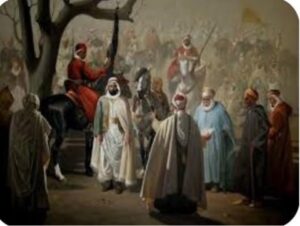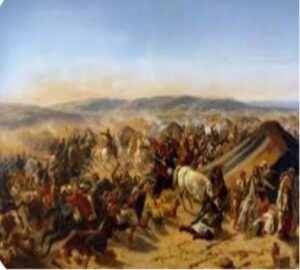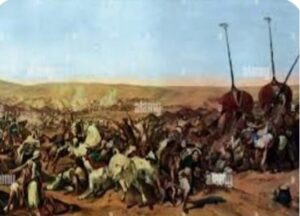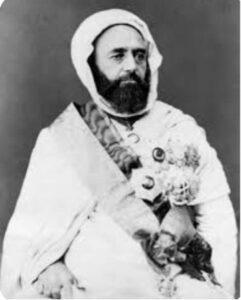Abdelkader ibn Muḥy al-Dīn, known through his spiritual heritage and descent from the Idrisside monarchy and the Prophet Mohammed, was also called Al Emir Abdelkader or Abdelkader Ben Muḥy al-Dīn al-Hassani al-Jaza’iri. He emerged as a leader of modern Algeria, leading the struggle against French colonial invasion in the early 19th century. As both a Muslim scholar and Sufi who found himself leading a military campaign, he united Algerian tribes in successfully resisting one of Europe’s most advanced armies for many years.

His unwavering commitment to what we now call human rights, particularly regarding his Christian opponents, earned him widespread admiration. His crucial intervention to save Damascus’s Christian community from massacre in 1860 brought him honors from around the world. In Algeria, he succeeded in uniting numerous Arab and Berber tribes against French colonization. French writers described him as a “modern Jugurtha,” while his unique ability to combine religious and political authority earned him the title “Saint among Princes, the Prince among Saints.”

During the July 1860 conflict between the Druze and Maronites of Mount Lebanon that spread to Damascus, when local Druze attacked the Christian quarter killing over 12,000 people, Abdelkader had already warned both the French consul and the Damascus Council of impending violence. When violence erupted, he sheltered numerous Christians in his home, including foreign consulate heads and religious groups such as the Sisters of Mercy. He sent his eldest sons into the streets offering his protection to threatened Christians, and many survivors credit him with playing a decisive role in their rescue.

A survivor’s testimonial states: “We were dismayed, all convinced that our last hour had come […]. In the midst of waiting for death, in those indescribable moments of anguish, heaven sent us a savior! Al Emir Abd el-Kader appeared, with the blessing of God and all the saints, surrounded by hundreds of his Algerians. He was on horseback and unarmed: his handsome figure, with the sublime soul that gave him calm and imposing, contrasted strangely with the noise and disorder that reigned everywhere.”

For his role in Syria, Abdelkader received international recognition including the Grand Cross of the Legion of Honor, the Grand Cross of the Redeemer from Greece, the Order of the Medjidié (first class) from Turkey, and the Order of Pope Pius IX from the Vatican. Abraham Lincoln sent him a pair of inlaid pistols (now displayed in the Algiers Museum) and Great Britain presented him with a gold-inlaid shotgun.
Al Emir Abdelkader pioneered the foundations of humanitarian law, as noted by scholars studying his historical, religious, Sufi, and humanitarian dimensions. His humanitarian perspective set him apart from his contemporary Arab intellectuals as a champion of universal human rights, transcending religious, cultural, and intellectual boundaries.
Many specialists, particularly orientalists, consider him the forerunner of modern international humanitarian law codification. His ideas laid groundwork for universal values later developed by the Red Cross and other international institutions.
While acknowledging that human rights principles appear in various Judeo-Christian religious texts and earlier sources, researchers note that Abdelkader’s contribution lies in successfully translating these principles from concept to practice. This has sparked scholarly discussion about human rights in relation to religious precepts, particularly Islamic ones, and the Universal Declaration of Human Rights.
Al Emir Lahouari Benarba Ben Mahiedinne Al Hassani
President, Les Valeurs du Monde Unis


Comentários recentes